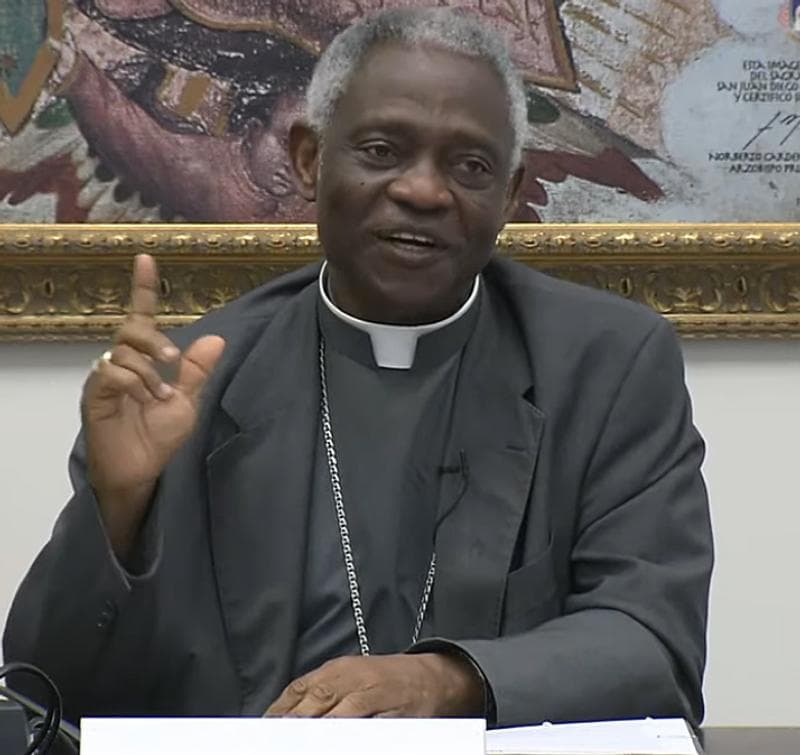ROME – On Tuesday, the Vatican COVID-19 taskforce issued a call for global disarmament during the coronavirus pandemic, and investment in what they said are peacemaking measures such as healthcare, food security and the environment.
Ghanaian Cardinal Peter Turkson, head of the Vatican department for Integral Human Development and president of the taskforce, said during a July 7 press briefing that the world is currently “facing one of the worst humanitarian crisis since the Second World War.”
An environmental crisis coupled by the threat of a vast economic recession and the significant loss of human life amid fragile healthcare systems has caused “a tsunami of humanitarian crises, which has spread and spared no human life,” he said, noting that domestic violence, discrimination, prejudice, and global conflicts have all “reared their ugly head” during the pandemic.
Pointing to a recent appeal by the United Nations Security Council for a global ceasefire while attempting to tackle the coronavirus, Turkson insisted that “peace and solidarity” is what the world needs to fight the virus.
Quoting United States President Dwight Eisenhower’s 1953 speech to the speech to UN general assembly, he said there must be no “atoms for war, but atoms for peace,” and urged for global disarmament and the implementation of efforts aimed at peace-making, trust-building, and reconciliation.
Sister Alessandra Smerilli, coordinator of the economic group of the taskforce, stressed that, “we are at a stage in which we must understand where to direct financial resources during this paradigm shift.”
“Today, the first safety is that of health and well-being,” she said, asking, “What are arsenals for, if a handful of infected people are enough to spread the epidemic and cause many victims?”
Noting that Pope Francis challenged the taskforce to come up with creative solutions and to explore new models of thinking and acting as a result of the pandemic, she argued against a pandemic “arms race,” and urged the global community to “race towards food, health and work security.”
“What are citizens asking for right now? Do they need a strong military state, or a state that invests in common goods? How would every citizen want their money to be spent today? Does it make sense to continue to make massive investments in weapons if human lives cannot be saved because there is no adequate healthcare system? If I have a sick person in the family, for example, who needs medical treatment, won’t I direct all my resources to treating my family member?” she asked.
Smerilli noted that the issue is complex but insisted that choosing to invest in arms and military power during COVID-19 will only perpetuate a “vicious circle that never ends.”
Asked about job loss that would result from disarmament, she insisted that these losses would be balanced out by the creation of new jobs thanks to investment in healthcare and the environment.
“We need courageous leaders who can demonstrate that they believe in the common good, who are committed to guaranteeing what is most needed today,” she said.
Alessio Pecorario, coordinator of the security group of the taskforce and an official in Turkson’s department, stressed the need to invest in food security and said a ceasefire is key stabilizing conflict zones, allowing much-needed humanitarian aid to be delivered to communities who are at risk.
Calling for a “moratorium on weapons production and dealing,” he noted that according to the Stockholm International Peace Research Institute (SIPRI), global military spending reached $1.9 trillion in 2019 – a figure he said far surpasses military spending during the Cold War and which is 300 times the budget of the World Health Organization.
“Choices have to be made,” he said, adding that, “Medical supplies, food security and economic revival focused on social justice and green economy all require resources that can be diverted from the military sector in the context of renewed arms control.”
Noting that the number of people risking starvation is expected to double as a result of COVID-19, Pecorario said, “a bleak innovation of the present crisis is that it combines the COVID-19 pandemic with the nationalist adventurism and economic inequality last seen prior to 1914 and 1939, with the emerging economic slump last seen in the 1930s in combination with nuclear weapons and the rapid onset of climate change.”
He recalled how in the wake of the Second World War international institutions were established with the goal of supporting the development of peace, saying that amid the coronavirus crisis, “human and financial resources and technology should be used to create and stimulate strategies, alliances and systems to protect lives and the planet and not to kill people and ecosystems.”
Follow Elise Ann Allen on Twitter: @eliseannallen














